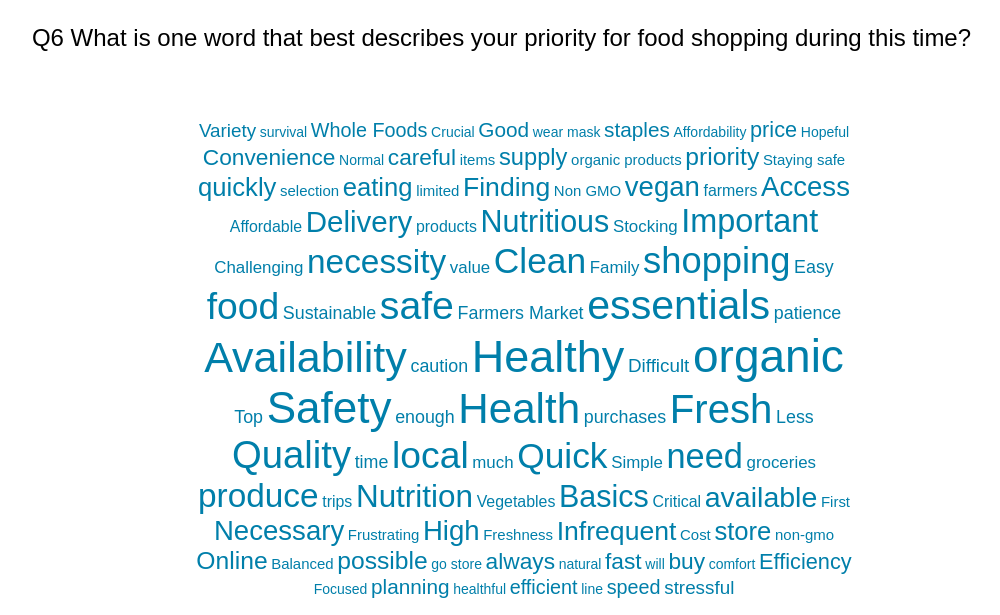Organic Trade Association takes pulse of shoppers in online survey
As the initial pantry-loading phase of the COVID-19 pandemic subsides, households of all sizes have begun to settle into longer-term routines and shopping patterns. For those shoppers who prioritize organic, their commitment to the label remains strong, even as so much has changed within their daily lives.
To help organic businesses understand how demand for their products may evolve in the near term, the Organic Trade Association conducted an online consumer poll of 3,188 “likely organic” shoppers from Tuesday, April 28, to Wednesday, May 6, 2020.
Five key findings emerged:
1. Organic is now more important than ever.
More than 90 percent of respondents indicated that, in their current food shopping, organic is more important than ever. The commitment to organic has always been at the intersection of health and safety, and that connection resounds even more these days.
2. Organic shoppers are prioritizing produce, dairy and meats in their purchases.
With less time spent in the grocery store, and less selection on the shelves, an overwhelming majority of shopppers said they prioritize organic when purchasing produce (93 percent). Still, animal-based foods were top of mind for many, with 46 percent of those responding indicating choosing organic dairy was important, and 39 percent expressing a preference for organic meat.
3. Willing to walk on the wild (organic) side.
Moving out of the initial basics buying phase, within their organic purchases, 82 percent of shoppers said they are open to experimenting with new products or brands. That’s good news for organic entrepreneurs and existing brands alike. And it makes sense; with most restaurants, sporting events and other public spaces shuttered, trying a new product is one way to add some variety to the days.
4. It’s a complicated time (to shop for groceries).
The poll asked organic shoppers to give one word that described their priority for food shopping at this time. In addition to organic, they also cited health and safety, anxiety and availability. They talked about food delivery, but also mentioned their favorite stores. They reported wearing masks and being hopeful. In short, they painted a pretty good picture of what it’s like to shop for groceries in this moment.

5. Current changes will have lasting impact.
When asked how they anticipate their organic shopping habits to evolve over the coming 3-6 months, 56 percent of shoppers indicated that the changes they have experienced (including home cooking, and simplified ways of eating) will become lasting habits. As shoppers continue to prioritize health and wellness and proactive self-care through the pandemic, continued growth in organic is likely – not just around the perimeter of the store, but within also within grocery, supplements, and pet care.
More to come
The online consumer poll is part of a multi-pronged effort by the Organic Trade Association to look not only at shifting patterns in organic shopping since the COVID-19 crisis began, but to gather intelligenc on the overall retail landscape for organic, and on the organic supply chain, and where the supply chain is holding together and where it’s being challenged. The assoiciation is working with Mercaris Data Service, Category Partners strategic insights company, and SPINS data technology company to put together the latest insights and outlooks for the organic sector.
The COVID-19 related data, along with the Organic Trade Association’s 2020 Organic Industry Survey, which will look at organic retail sales in the U.S. in 2019, will be released in June.
The Organic Trade Association (OTA) is the membership-based business association for organic agriculture and products in North America. OTA is the leading voice for the organic trade in the United States, representing over 9,500 organic businesses across 50 states. Its members include growers, shippers, processors, certifiers, farmers' associations, distributors, importers, exporters, consultants, retailers and others. OTA’s Board of Directors is democratically elected by its members. OTA's mission is to promote and protect ORGANIC with a unifying voice that serves and engages its diverse members from farm to marketplace. The Organic Trade Association does not discriminate on the basis of age, disability, national origin or ancestry, race, gender, religion, sexual orientation, marital status, political affiliation or military status. Persons with disabilities who require alternate means for communication of program information can contact us at info@ota.com.
